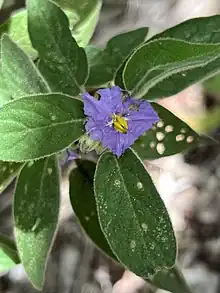| Solanum nemophilum | |
|---|---|
 | |
| Scientific classification | |
| Kingdom: | Plantae |
| Clade: | Tracheophytes |
| Clade: | Angiosperms |
| Clade: | Eudicots |
| Clade: | Asterids |
| Order: | Solanales |
| Family: | Solanaceae |
| Genus: | Solanum |
| Species: | S. nemophilum |
| Binomial name | |
| Solanum nemophilum | |
Solanum nemophilum, is a flowering plant in the family Solanaceae and grows in New South Wales and Queensland. It has purple flowers and is densely covered with star-shaped hairs.
Description
Solanum nemophilum is a shrub to 1.5 m (4 ft 11 in) high, thickly covered in star-shaped hairs, rarely prickly but sometimes occur on branches. The leaves are elliptic to lance-shaped, rarely oval-shaped, 3–6 cm (1.2–2.4 in) long, 1.5–2.5 cm (0.59–0.98 in) wide, edges entire, upper and lower surfaces with soft, smooth, star-shaped hairs and both surfaces slightly a different colour on a petiole 0.5–1 cm (0.20–0.39 in) long. The flowers are in a cluster of 1–4 on a peduncle up to 5 mm (0.20 in) long and the individual flowers on a pedicel about 5 mm (0.20 in) long. The corolla is star-shaped, 15–25 mm (0.59–0.98 in) in diameter, purple or bluish, shallowly fused, the calyx 5–8 mm (0.20–0.31 in) long, each lobe 2–5 mm (0.079–0.197 in) long. Flowering occurs mostly from spring to summer and the fruit is a red berry, 5–8 mm (0.20–0.31 in) in diameter and mostly covered by the calyx lobes.[2][3]
Taxonomy
Solanum nemophilum was first formally described by Ferdinand von Mueller and the description was published in Fragmenta Phytographiae Australiae.[4]
Distribution and habitat
This species of solanum grows on stony outcrops in south-eastern Queensland and in the Gibraltar Range in New South Wales.[2]
References
- ↑ "Solanum nemophilum". Australian Plant Census. Retrieved 21 April 2023.
- 1 2 Conn, B.J. "Solanum nemophilum". PlantNET-NSW flora online. Royal Botanic Garden Sydney. Retrieved 22 April 2023.
- ↑ Symon, D.E (1981). "Solanum nemophilum" (PDF). Swainsona (4): 144–145. Retrieved 22 April 2023.
- ↑ von Mueller, Ferdinand (1861). Fragmenta Phytographiae Australiae. Vol. v.2 1860-61 (2 ed.). Melbourne. p. 161. Retrieved 22 April 2023.
{{cite book}}: CS1 maint: location missing publisher (link)